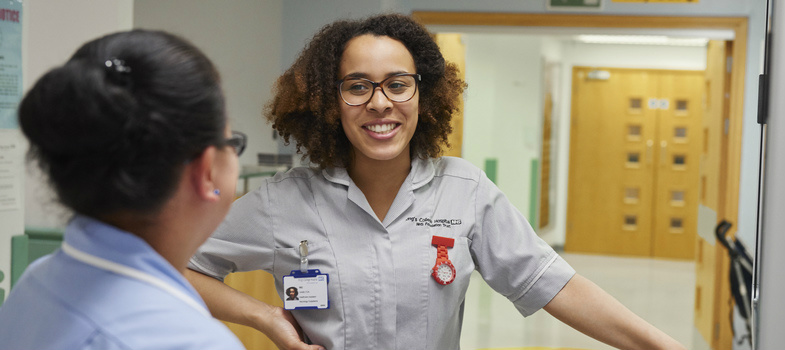2.8 Swallowing and saliva problems
Many people with Parkinson’s have trouble swallowing at some point during the course of their condition. Drooling is one of the first signs of a swallowing problem. This will happen because the person can’t close their lips properly, finds it hard to swallow regularly or aren’t sitting in a good position. This can cause saliva to collect in the mouth, which can cause overspill and drooling. This can be embarrassing and lead people to avoid social situations.
There are four main problems that are linked to swallowing:
- a chest infection caused by food or liquid from the mouth going into the lungs rather than the stomach (known as ‘aspiration pneumonia’)
- not eating enough to maintain good general health (malnutrition)
- not drinking enough, which can lead to constipation or dehydration
- food blocking the airway and stopping a person’s breathing (asphyxiation).
Because of this it is very important to seek medical advice if someone has problems with swallowing.
Some problems with swallowing may not always be obvious to you or the person with Parkinson’s. If the food we swallow enters our windpipe instead of our food pipe, our bodies react by coughing to stop food entering the lungs. In some cases, people with Parkinson’s can have what’s called ‘silent aspiration’. This is when food enters the windpipe and goes down into the lungs without any of the usual signs of coughing or choking. This can lead to problems such as aspiration pneumonia.
As well as the social anxieties caused by problems with eating, some people may also be afraid of choking. Swallowing difficulties may also make it harder for people to take their medication. Providing iced water with medication or meals may help with swallowing.
A person with Parkinson’s may also show signs of a swallowing problem if they:
- can’t clear food from their mouth, or if food sticks in their throat
- have pain or discomfort in their chest or throat
- have an unclear voice
- cough or choke on food, drink or saliva
- experience weight loss
- have trouble swallowing their medication
- have heartburn, acid reflux or lots of chest infections.
Actions to take
- Report any problems. Your client may benefit from seeing the speech and language therapist or dietitian.
- A speech and language therapist can help your client with exercises to strengthen the lip, tongue and throat muscles. They can also advise on ways to improve breathing techniques.
- A dietitian can advise your client on changes to their diet so that foods and liquids are easier and safer to swallow. For example, avoiding hard, dry or crumbly foods. Liquids may be thickened with powdered thickeners, milk powder, instant potato powder or plain yoghurt, as thicker liquids move more slowly and are easier to control.
- Make sure that medication is taken on time so that the person can swallow well at mealtimes. Changes to a person’s medication regime may also help and there are drugs that may control saliva production. A doctor may inject Botox (botulinum toxin) into the salivary glands to quickly reduce saliva.
- Try making changes to the person’s posture when they’re eating or drinking – having their head tilted forwards will make it harder for food to go to the lungs.
- If the person’s dentures are loose and uncomfortable, they’ll need to see the dentist.
For some people, these solutions will not be enough and a different feeding method might be needed. Some people with Parkinson’s may also experience problems with a dry mouth. Specialist dry mouth products, such as artificial saliva, are available. Their Parkinson’s nurse will be able to provide advice.
Find out more in the Parkinson’s UK eating swallowing and saliva control information sheet [Tip: hold Ctrl and click a link to open it in a new tab. (Hide tip)] .
2.7 Eating and drinking difficulties


